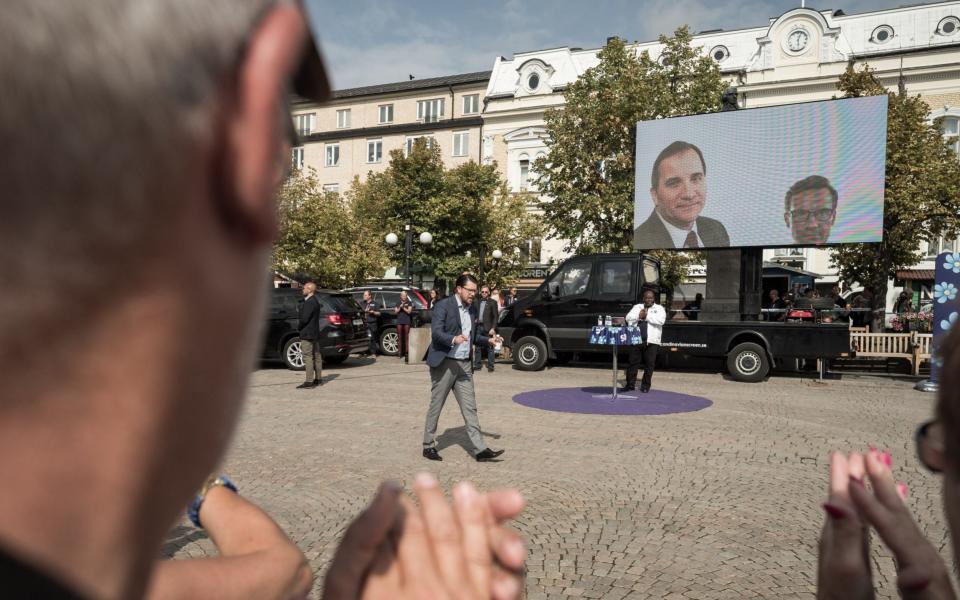'We will be the new Denmark': Swedish hard-Right leader vows to tighten immigration

Sweden will follow Denmark by introducing strict immigration controls, the leader of its populist opposition party has promised a week after launching a breakthrough deal with parties likely to take power next year.
"Denmark was the same way as Sweden, and then it just changed overnight, and that will happen in Sweden too," Jimmie Åkesson said in a rare interview with international media.
Last Sunday, the Sweden Democrats and the three centre-Right parties announced a proposal that for the first time showed them negotiating and setting migration policy together, something Mr Åkesson described as "a very important symbol" of cooperation.
The move mirrors a deal made in Denmark that gave the Danish People's Party a stranglehold on the right-wing government and dramatically shifted political debate in the country, with even the current Left-wing government driving through a string of controversial migration policies this year including plans to send Syrian refugees home and plans to open a migration processing centre in Rwanda.
"We actually in Sweden need a stricter policy than Denmark, because we have much bigger problems, Mr Åkesson told The Telegraph. "I don't think it's possible to just decrease immigration to Danish levels anymore. We need to take it further."
Public opinion in Sweden has seen a marked shift since the refugee crisis in 2015, with 40 per cent of the population concerned about the "rising number of refugees" last year, according to an opinion survey by the SOM research institute, up from 22 per cent in 2011.
Voters have rated immigration and integration as the most important social problem for four out of the last five years, according to the institute, with law and order, another Social Democrat campaign issue close behind.

The shift in the Swedish political landscape means that three out of the four centre-right parties that together ruled Sweden up until 2014 have now dropped their opposition to working with the Sweden Democrats.
The move has raised concerns among critics concerned about the neo-Nazi backgrounds of some early members, with its first chairman involved as a teenager with the Nordic Realm Party, and its first treasurer a committed Nazi who served in the Waffen SS during World War II.
"Our goal is to be a part of the government," Mr Åkesson said of political negotiations ahead of next year's election. "But we also realise that maybe that's not possible this time. Maybe we have to show that we are a party that wants to take responsibility for real."
When the Danish People's Party twenty years ago gained a similar kingmaker position over the centre-Right Liberal party, it used its leverage to drive through what it boasted was Europe's strictest immigration policy.
Public opinion in supposedly progressive Denmark has since shifted so dramatically that even the Left-wing Social Democrat government frequently takes positions on immigration to the right of those taken by other Western European countries.
It is seeking, for instance, to send Syrian refugees back into the hands of the brutal regime of President Bashar al-Assad, and to house refugees in an African or Middle Eastern country while their cases are processed.
"The Danish example is a very good example because they showed that they could have really great influence, even though they were not in the government," Mr Åkesson said.
"I'm sure we will go that far. We have had public opinion in our favour, and that's been the case for decades. The problem has been that the old parties haven't followed that opinion."
This, he said, was what had helped his party to grow so fast, polling higher than any other in the run-up to the 2018 election, when a quarter of voters said they intended to vote for it in one YouGov poll.

Last Sunday, the Sweden Democrats tabled a joint migration proposal with the Moderate, Christian Democrat and Liberal parties which would impose tougher language requirements on those seeking permanent residency and strip away a proposed loophole giving residency on "humanitarian grounds". As the first common policy proposal of the four parties, Mr Åkesson said it sent "an important signal".
In the interview, Mr Åkesson downplayed the neo-Nazi backgrounds of some his party's founders.
"It's true that we had some individuals in the beginning with that kind of background," he said. "But it's also true that they are not still with us.
"Internally, today, that's not something we talk about, because it's not interesting for us. But of course, our political opponents talk about that a lot because they don't want to talk about the real issues, and it's very easy to call us 'racists' or 'neo-Nazis'."
In his view, he said, his party was not even populist.
"We are more of a traditional conservative party. I think we are much closer to the Tories than the Front National [Rassemblement National]."
Although he said it had been the party's opposition to joining the European Union which had drawn him as a student to the Sweden Democrats back in 1995, he said exiting the European Union was currently a "dead issue" in Sweden, which was why his party had dropped its proposal to follow the UK with a renegotiation and in-out referendum.
But he predicted that over the coming years, Britain's performance would make leaving the European Union look more attractive again.
"I think Britain will have benefits because of Brexit in the long-term," he said. "I'm sure they will."

